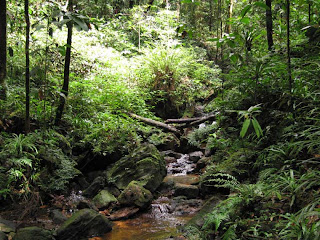SINHARAJA RAIN FOREST
Sinharaja Rainforest is a world
heritage site and major eco tourism destination, which can also be described as
a Tropical Lowland Rainforest or Tropical Wet Evergreen Forest. Whatever its
‘technical’ name, it is undoubtedly a rich treasure trove of nature with a
great diversity of habitats and a vast repository of Sri Lanka’s endemic
species found no where else in the world. BIRD WATCHING in this ecosystem is
particularly interesting because it is home to 95% of the endemic birds of Sri Lanka!
Named as a world heritage site in 1989, this lowland evergreen rain forest is
steeped in deep legend and mystery. The word ‘Sinharaja’ means, Lion (Sinha)
King (Raja), and it is popular belief that the legendary origin of the Sinhala
people is from the union between a princess and the lion king who once lived in
the forest!
The forest steeped in deep legend
and mystery. The word Sinharaja means, lion (sinha) king (raja) and the popular
belief is that the legendary origin of the Sinhala people in Sri Lanka is from
the descendants of the union the lion king who once lived in the forest and a
princess. Sinharaja Forest Reserve is one of the least disturbed and
biologically unique lowland rain forests now remaining in Sri Lanka.
This forest covers an extent of
approximately 11187 ha. From east to west the length of the forest is about 21
km. And its width from north to south is about 3.7 km. The Sinharaja forest was
initially declared a Man and Biosphere Reserve (MAB) in 1978, as representative
of Tropical Humid Evergreen Forest ecosystem in Sri Lanka and has been
recognized by UNESCO as part of its International Network of Biosphere
Reserves.
Subsequently it was declared a
National Wilderness Area, under the National Heritage Wilderness Area Act, in
1988 and lately a World Heritage Site in 1989.It is the Sri Lanka ‘s first
natural resource to earn this esteemed distinction. This forest is situated in
the southwest lowland Wet Zone of the country at latitudes 6 21- 6 26 and
longitudes 80 21- 80-34.It spans over the administrative districts of
Ratnapura, Galle and Matara.
Sinharaja forest consists of a
series of continuous ridges, aligned approximately in an east-west direction
and lies between the tributaries of the Kalu Ganga in the north and the Gin
Ganga in the south.
There are four main routes of access
to Sinharaja. The Kalawana- Weddagala road from the northwest, The
Rakwana-Morning side estate road from the northeast, the Hiniduma-Neluwa road
from the southwest and Deniyaya-Pallegama road from the southeast. Among these
roads the Kalawana-Weddagala road is shorter and more convenient for visitors
traveling from Colombo .













No comments:
Post a Comment